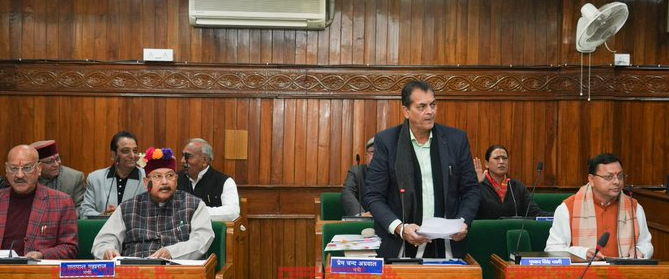Dehradun: The Uttarakhand government Tuesday tabled in the assembly the Uniform Civil Code Bill, which when passed will be the first such legislation to be implemented in any state after Independence.
The bill proposes a common law on marriage, divorce, land, property and inheritance for all citizens irrespective of their religion in Uttarakhand, excluding the Scheduled Tribes.
The bill stipulates registration of live-in relationships in the state and imprisonment of three months for failure to do so within a month. Any child born out of such a relationship will be considered legitimate.
The Uniform Civil Code (UCC) of Uttarakhand, 2024 Bill was tabled in the House by Chief Minister Pushkar Singh Dhami, who in a symbolic gesture, entered the assembly with a copy of the original Constitution.
Treasury benches welcomed the tabling of the bill with thumping of desks and chants of “Bharat Mata Ki Jai”, “Vande Mataram” and “Jai Shri Ram”.
The original list of business for the day said the bill will be tabled, debated and passed by the House, but Speaker Ritu Khanduri amended it conceding to the demands of the opposition members who wanted more time to study the bill and present their views on it.
Before the bill was tabled, there were protests inside the House by opposition members who said they were not given time to study its provisions.
“It seems the government wants to pass the bill without a debate in violation of the legislative traditions,” Leader of Opposition Yashpal Arya said.
Slogans were also raised by the opposition members, who were pacified after the Speaker assured them that they would get enough time to study the bill.
They also protested against the decision of the business advisory committee of the House to suspend the Question Hour to table the UCC.
They contended that the Question Hour was necessary to raise issues of public interest like disasters, including land-subsidence in Joshimath and justice to Ankita Bhandari, the receptionist of a resort in Pauri district who was murdered allegedly by her employer.
The bill applies to the whole of Uttarakhand and also to people from the state who reside outside its territories.
However, the Scheduled Tribes have been left out of the ambit of the bill.
“Nothing contained in this code shall apply to the members of any Scheduled Tribes…. And the persons and group of persons whose customary rights are protected under Part XXI of the Constitution of India,” the bill states.
It will come into force from the date it is notified in the gazette.
The bill makes it obligatory for partners of a live-in relationship within the state, whether they are residents of Uttarakhand or not, to submit a statement of their relationship under sub-section (1) of section 381 to the Registrar within whose jurisdiction they are living in a prescribed format. It also says any child of a live-in relationship shall be a legitimate child of the couple.
Live-in relationships in which at least one partner is a minor will not be registered. Live-in relationships where the consent of one of the partners was obtained by force, coercion, undue influence, misrepresentation or fraud concerning the identity of the other partner will also not be registered.
The registrar will examine the content of the statement of live-in relationships to ensure that they are not of such a kind as mentioned under section 380.
Anyone staying in a live-in relationship for more than a month without getting it registered will be punishable with imprisonment up to three months or a fine of up to Rs 10,000 or both, the bill says.
A higher fine apart from an imprisonment of up to three months can be imposed on any person who provides false information in his or her statement on a live-in relationship to the Registrar.
If a woman in a live-in relationship gets deserted by her partner, she will be entitled to claim maintenance from him for which she may approach a competent court having jurisdiction over the place where they last cohabited.
Once it becomes an act, Uttarakhand will become the first state in the country after Independence to adopt the UCC. It has been operational in Goa since the days of Portuguese rule.
The ongoing session of the state assembly was convened especially for the passage of the UCC bill.
Passing a legislation on the UCC will fulfil a major promise made by the BJP to the people of the state in the run-up to the 2022 Assembly polls, which saw the saffron party storm to power with a landslide victory for the second consecutive term.
Several BJP-ruled states in the country, including Gujarat and Assam, have expressed their keenness to follow the Uttarakhand UCC as a model.
PTI
